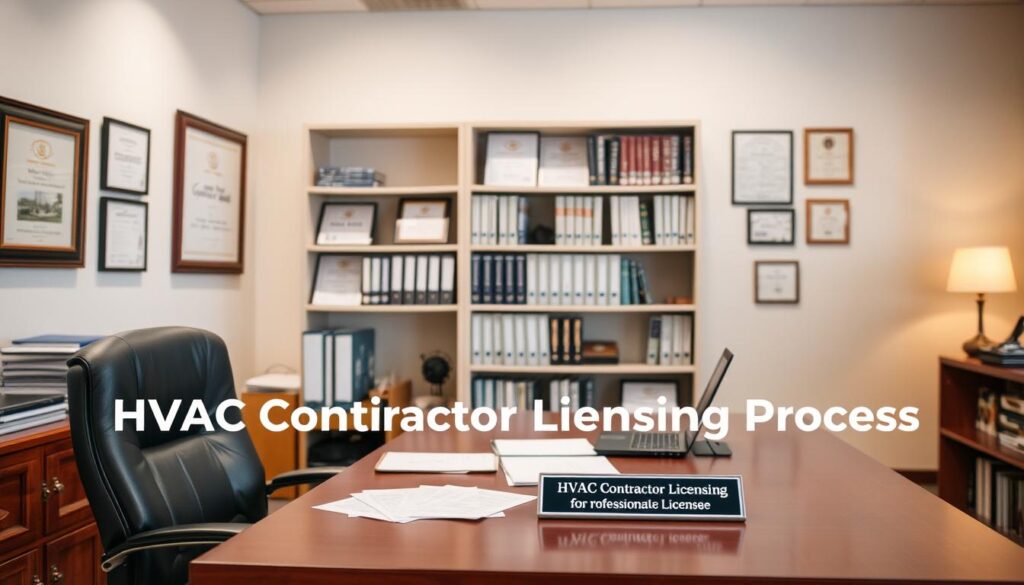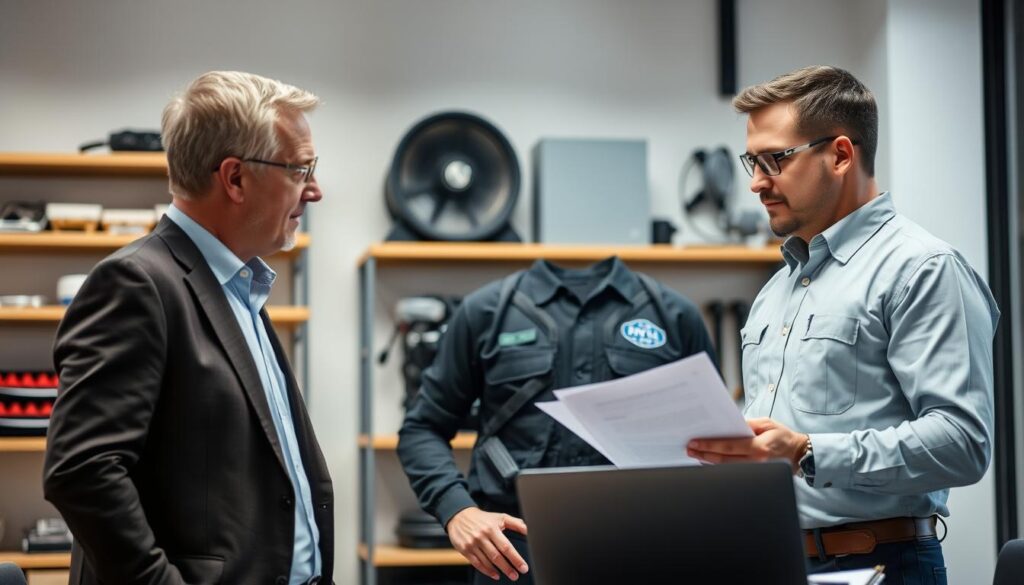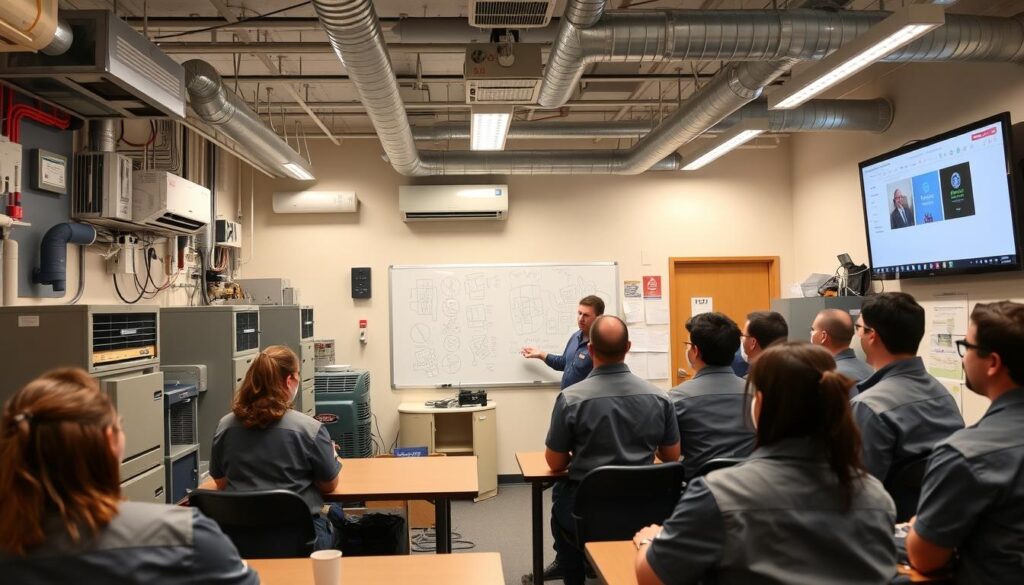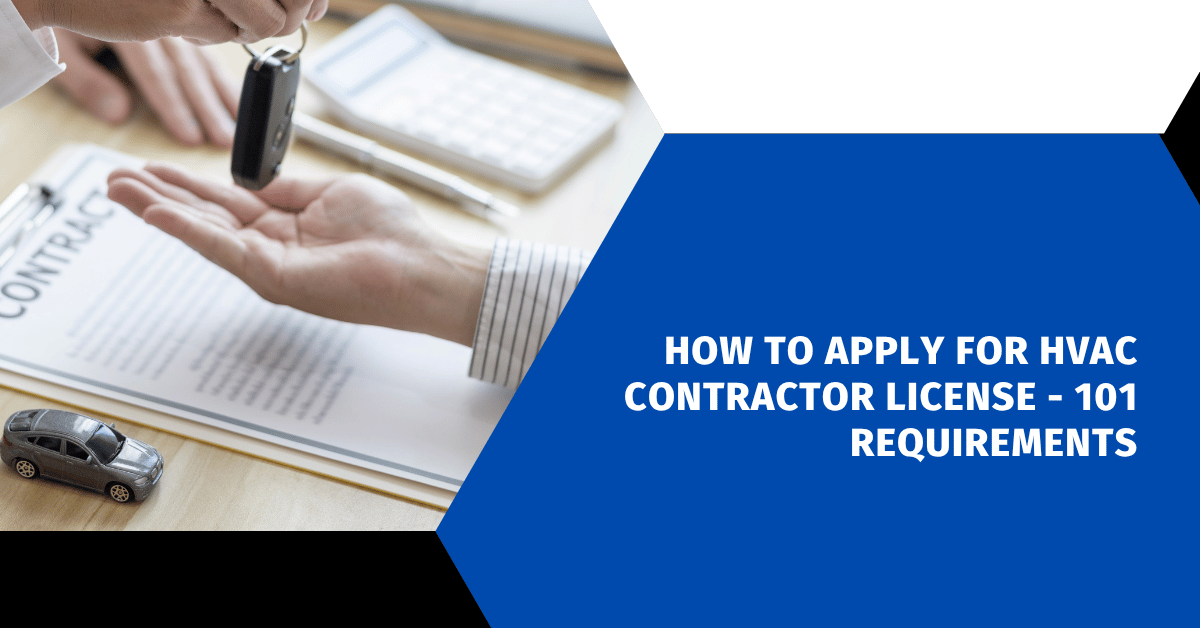Affiliate Disclosure
HVAC Guide Guys is a participant in the Amazon Services LLC Associates Program, an affiliate advertising program designed to provide a means for sites to earn advertising fees by advertising and linking to Amazon.
How to Apply for HVAC Contractor License? Are you ready to turn your HVAC technical skills into a professional career? Navigating the HVAC licensing requirements can seem like a complex maze. But what if you could unlock the secret to becoming a certified contractor with confidence?

Becoming a licensed HVAC contractor involves more than just technical expertise. Each state has unique regulations that determine how you can apply for an HVAC contractor license. Understanding these requirements is crucial for launching your professional career in the heating, ventilation, and air conditioning industry.
Your journey to becoming a licensed HVAC contractor starts with knowing the foundational steps. From educational prerequisites to work experience requirements, this guide will walk you through the essential elements of obtaining your HVAC licensing requirements.
Key Takeaways
- HVAC licensing requirements vary by state
- Minimum age and education are standard prerequisites
- Practical work experience is critical for licensing
- Documentation and examinations are mandatory
- Professional certification demonstrates competence
Table of Contents
Understanding Basic HVAC Licensing Requirements
Getting into HVAC licensing can seem tough, but knowing the basics is key. Each state has its own rules for HVAC licenses. You’ll need to look into these carefully.
Before starting your HVAC journey, you must meet some important steps. These steps are the first part of getting certified in HVAC.
Age and Educational Prerequisites
States have certain rules for HVAC workers. You’ll usually need to:
- Be at least 18 years old
- Have a high school diploma or GED
- Finish a state-approved training program
Work Experience Requirements
Having real-world experience is crucial. You’ll need to:
- Get 2,000 to 4,000 hours of on-the-job training
- Work under a licensed HVAC pro
- Gain experience in installing and fixing systems
State-Specific Variations
The rules for HVAC certification change from state to state. California might need different things than Texas or Florida. Always check with your local licensing board for the exact rules.
Pro Tip: Keep good records of your training, work hours, and education.
Knowing these basic requirements will help you get ready for the certification process. It’s a big step towards starting your HVAC career.
Explore Our HVAC Shop
Looking for top-rated HVAC tools, parts, and accessories? Visit our shop and find the perfect solution for your needs.
Visit the ShopEssential Documentation for License Application
To become a licensed hvac contractor, you must prepare your application carefully. You need a lot of paperwork that shows you’re qualified and have the right background.
When you apply for an hvac business license, you’ll need to collect important documents. These prove you’re skilled and meet the requirements. They show your professional and personal qualifications.
- Proof of work experience documentation
- Educational certificates and transcripts
- Valid government-issued identification
- Professional references
- Trade school or apprenticeship completion certificates
Your application package should show your professional journey in detail. State licensing boards check this to make sure you meet high standards.
| Document Type | Purpose | Recommended Format |
|---|---|---|
| Work Experience Records | Validate professional history | Signed employer verification or detailed work logs |
| Educational Transcripts | Confirm technical training | Official sealed transcripts from accredited institutions |
| Background Check | Ensure professional integrity | State-approved criminal background report |
Pro tip: Organize your documents systematically and make certified copies to streamline your hvac business license application process.
Thorough documentation is your gateway to becoming a licensed professional in the HVAC industry.
How to Apply for HVAC Contractor License
Getting an HVAC contractor license needs careful planning and preparation. Your path to becoming a licensed HVAC contractor has key steps. These steps can greatly affect your career.
First, collect all needed documents. Also, know the specific rules for applying for an HVAC contractor license in your state.
Application Form Completion
It’s vital to fill out your HVAC business license application correctly. Here are some important tips:
- Get the official state licensing board application form
- Fill out every section fully and clearly
- Check your personal and professional details carefully
- Include proof of the needed work experience
- Attach copies of your educational certifications
Document Submission Process
Each state has its own rules for submitting your HVAC contractor license application. Usually, you’ll need to:
- Put together all the required documents
- Make sure you know how to submit (online or by mail)
- Prepare certified copies of your credentials
- Send in a complete application package
Fee Structure and Payment Methods
Licensing fees differ a lot from state to state. Here’s a quick look at what you might pay:
| State | License Application Fee | Payment Methods |
|---|---|---|
| Tennessee | $115 | Credit Card, Check |
| Nebraska | $250 | Online Payment, Money Order |
Plan to spend money on your professional license. Budget for application fees and extra costs for exams or background checks.
Explore Our HVAC Shop
Looking for top-rated HVAC tools, parts, and accessories? Visit our shop and find the perfect solution for your needs.
Visit the ShopTechnical and Business Examination Overview
To become a licensed hvac contractor, you must pass detailed technical and business exams. These tests check if you’re ready for HVAC work in many important areas.
The licensing exam has two main parts:
- Technical HVAC Skills Assessment
- Business and Legal Regulation Test
Getting ready for the exam means learning about complex systems and rules. The technical part tests your hands-on HVAC knowledge.
Important areas to focus on include:
- System design and installation
- Electrical and mechanical principles
- Safety protocols
- Energy efficiency standards
Most people pass the first time with a 74% success rate. This is if they study well and prepare thoroughly. Special courses can really help you pass these tough tests.
“Thorough preparation is the key to successfully becoming a licensed hvac contractor.” – Professional HVAC Training Association
Good study tips are practicing questions, going to review classes, and using guides specific to the HVAC field. These help with both technical skills and managing a business.
EPA Certification Requirements and Process
Getting EPA certification is key for HVAC contractors. The Environmental Protection Agency (EPA) makes sure you’re qualified to handle refrigerants. This is for your safety and the environment’s.
The Clean Air Act says all technicians must be certified. This shows you’re skilled and serious about your work.
Types of EPA Certifications
EPA has three main certifications for HVAC pros:
- Type I: Small appliances (window ACs, refrigerators)
- Type II: High-pressure and electric equipment
- Type III: Low-pressure refrigeration systems
Examination Preparation Tips
To get EPA certified, you need to study hard. Here’s how to prepare:
- Study official EPA study guides
- Take practice exams
- Understand refrigerant recovery procedures
- Learn environmental protection protocols
“Proper certification is not just a requirement, but a mark of professional excellence in HVAC services.” – EPA Training Manual
Certification Maintenance
To keep your EPA certification, you need to renew it often. Most certifications last 2-3 years before you need to get recertified.
Explore Our HVAC Shop
Looking for top-rated HVAC tools, parts, and accessories? Visit our shop and find the perfect solution for your needs.
Visit the ShopInsurance and Bonding Requirements

When you become a licensed hvac contractor, knowing about insurance is key. It protects your business and meets legal standards. Each state has its own rules for insurance to keep your business credible and safe for clients.
HVAC contractor insurance usually includes a few main types:
- General Liability Insurance
- Workers’ Compensation Insurance
- Professional Liability Coverage
- Commercial Vehicle Insurance
The amount of insurance needed can change a lot by state. For example, some states ask for:
| State | General Liability Minimum | Workers’ Compensation |
|---|---|---|
| Texas | $300,000 per occurrence | Required for businesses with 3+ employees |
| California | $500,000 aggregate | Mandatory for all contractors |
Surety bonds are also very important for HVAC contractors. These bonds ensure you’ll finish the work as agreed upon. Most states need bonds from $10,000 to $50,000, based on your license type.
Having the right insurance is not just about following the law. It also keeps your HVAC business safe financially. It shows you’re professional and builds trust with clients as you become a licensed hvac contractor.
State-Specific Licensing Variations
Getting certified in HVAC can be tricky because of big differences in licensing rules. Each state has its own rules that affect how HVAC workers get certified.
It’s important for HVAC pros to know these differences. This is especially true if you want to grow your business or work in other states. Each state has its own set of rules and standards.
Class A and Class B License Distinctions
HVAC licenses come in different levels. These levels show what kind of work you can do:
- Class A License: Covers big commercial and industrial jobs
- Class B License: Focuses on homes and small commercial places
Regional Requirements Comparison
States have different rules for HVAC contractors. For instance:
| State | Minimum Experience | Exam Requirements |
|---|---|---|
| Florida | 4 years | State-specific technical exam |
| California | 5 years | Business and trade exams |
| Texas | 3 years | Comprehensive licensing test |
Reciprocity Agreements
Some states have agreements that let licensed contractors work in other states easily. These agreements can make it simpler to grow your HVAC business in nearby states.
Always check the specific rules of each state before trying to transfer or expand your HVAC license. Rules can change, so it’s crucial to stay updated to keep your professional status.
Explore Our HVAC Shop
Looking for top-rated HVAC tools, parts, and accessories? Visit our shop and find the perfect solution for your needs.
Visit the ShopProfessional Training and Education Programs

To become a licensed HVAC contractor, you need a solid plan. Start by choosing the right training that meets state licensing needs. Each state has its own path to becoming a licensed HVAC contractor. It’s important to know what your state requires.
There are several ways to get started in HVAC:
- Vocational school programs
- Community college technical degrees
- Apprenticeship training
- Bachelor’s degree in HVAC engineering
Getting ready for the HVAC contractor exam requires a lot of education. Most states accept different training methods. For example, Florida allows a bachelor’s degree in HVAC engineering plus 2,000 hours of work experience.
Your training should help you develop important skills:
- Technical system knowledge
- Installation techniques
- Repair and maintenance procedures
- Energy efficiency principles
- Safety protocols
After getting your license, keep learning. Continuous learning is key in the fast-changing HVAC world. Many top contractors keep up with new tech and stay ahead by always learning.
Invest in your education today to build a robust HVAC contracting career tomorrow.
Application Review and Processing Timeline
When you apply for an HVAC contractor license, knowing the review and processing timeline is key. The time it takes can vary a lot based on several important factors.
Processing times usually range from 4 to 12 weeks. This depends on your state’s rules and how busy they are. States with more detailed licensing might take longer to check your application.
- Typical processing duration: 4-12 weeks
- Factors affecting timeline:
- Completeness of submitted documentation
- State regulatory agency workload
- Background check processing
- Verification of work experience
To speed up your application, make sure to:
- Submit all needed documents correctly
- Check your application for everything
- Give clear, easy-to-read copies of your certifications
- Include all required supporting materials
Pro tip: If your application takes longer than expected, reach out to your state’s licensing board. They can give you updates and help with any problems.
Some states have online tracking for your application. This lets you see where it is in real-time. Check with your local licensing agency to see if they offer this service.
Explore Our HVAC Shop
Looking for top-rated HVAC tools, parts, and accessories? Visit our shop and find the perfect solution for your needs.
Visit the ShopLicense Maintenance and Renewal Requirements
Keeping your mechanical contractor license up to date is crucial. HVAC pros must stay on top of renewal to work legally in their state.
To renew your HVAC license, you need to follow important steps. These steps keep your professional reputation strong and ensure you meet industry standards.
Continuing Education Credits
Most states require continuing education to keep your license valid. These courses help you stay current with:
- Latest technological advancements
- Safety regulations
- Energy efficiency standards
- New industry practices
Renewal Deadlines and Financial Considerations
Each state has its own renewal rules and fees for mechanical contractor licenses. You’ll need to:
- Submit your renewal application on time
- Pay the renewal fees
- Show proof of continuing education hours
- Keep your professional insurance current
Compliance and Documentation
Being compliant means keeping detailed records of your credentials. Tracking your license status helps avoid legal issues that could harm your business.
Professional tip: Set calendar reminders for your license renewal to avoid last-minute complications.
By following these renewal steps, you’ll keep your professional status. You’ll also continue to offer vital HVAC services to your clients.
Conclusion
Becoming a licensed HVAC contractor takes hard work, smart planning, and a dedication to being the best. Your path to becoming a mechanical contractor includes many important steps. These range from getting the right education to passing tough exams and keeping your certifications up to date.
Getting licensed is more than just getting a piece of paper. It’s a big step in your career that can lead to more job chances, more respect, and better pay. Each state has its own rules for licensing, so knowing what’s needed in your area is key.
Staying ahead in the HVAC field means always learning and keeping up with new trends. Make sure to keep your skills sharp, your certifications current, and be ready for new technologies and rules. By following this guide, you’ll be ready to stand out as a top HVAC pro.
Keep in mind, your journey to get licensed is just the start. Always be ready to learn more, connect with others in the field, and see every challenge as a chance to grow. This way, you’ll keep getting better at both the technical and business sides of HVAC contracting.
FAQ
How long does it typically take to become a licensed HVAC contractor?
What are the minimum educational requirements for an HVAC contractor license?
Do I need to take an exam to become a licensed HVAC contractor?
How much does it cost to get an HVAC contractor license?
Is EPA certification mandatory for HVAC contractors?
What types of insurance do I need as an HVAC contractor?
How long does it typically take to become a licensed HVAC contractor?
What are the minimum educational requirements for an HVAC contractor license?
Do I need to take an exam to become a licensed HVAC contractor?
How much does it cost to get an HVAC contractor license?
Is EPA certification mandatory for HVAC contractors?
What types of insurance do I need as an HVAC contractor?
FAQ
How long does it typically take to become a licensed HVAC contractor?
It takes 2-5 years to get a license, depending on the state. You need education, work experience, and pass exams. Most states want 3-4 years of work experience before you can get your license.
What are the minimum educational requirements for an HVAC contractor license?
You need a high school diploma or GED. Some states want more education, like a vocational certificate or associate’s degree in HVAC. Work experience can also count.
Do I need to take an exam to become a licensed HVAC contractor?
Yes, you must pass two exams. The technical exam tests your HVAC knowledge. The business exam checks your understanding of contractor rules and local codes.
How much does it cost to get an HVAC contractor license?
Costs range from 0 to 0. This includes fees for applications, exams, and licensing. You might also need to pay for study materials, insurance, and background checks.
Is EPA certification mandatory for HVAC contractors?
Yes, EPA certification is needed for working with refrigerants. There are three types of certifications. Most get Universal Certification, which covers all three.
What types of insurance do I need as an HVAC contractor?
You need general liability, workers’ compensation, and possibly professional liability insurance. States require at least 0,000 to
FAQ
How long does it typically take to become a licensed HVAC contractor?
It takes 2-5 years to get a license, depending on the state. You need education, work experience, and pass exams. Most states want 3-4 years of work experience before you can get your license.
What are the minimum educational requirements for an HVAC contractor license?
You need a high school diploma or GED. Some states want more education, like a vocational certificate or associate’s degree in HVAC. Work experience can also count.
Do I need to take an exam to become a licensed HVAC contractor?
Yes, you must pass two exams. The technical exam tests your HVAC knowledge. The business exam checks your understanding of contractor rules and local codes.
How much does it cost to get an HVAC contractor license?
Costs range from $100 to $500. This includes fees for applications, exams, and licensing. You might also need to pay for study materials, insurance, and background checks.
Is EPA certification mandatory for HVAC contractors?
Yes, EPA certification is needed for working with refrigerants. There are three types of certifications. Most get Universal Certification, which covers all three.
What types of insurance do I need as an HVAC contractor?
You need general liability, workers’ compensation, and possibly professional liability insurance. States require at least $300,000 to $1 million in general liability coverage.
How often do I need to renew my HVAC contractor license?
Renewal periods vary, but most are 1-3 years. Renewal involves a fee and continuing education credits. Credits range from 4 to 16 hours.
Can I work in multiple states with a single HVAC license?
No, each state has its own licensing rules. Some states have agreements that help, but you must meet each state’s requirements.
What happens if I work without a proper HVAC contractor license?
Working without a license can lead to fines, legal trouble, and criminal charges. You might have to pay back fees and could be barred from getting a license.
Do I need different licenses for residential and commercial HVAC work?
Yes, many states require different licenses for residential and commercial work. Commercial work might need extra certifications or endorsements, depending on the project.
million in general liability coverage.
How often do I need to renew my HVAC contractor license?
Renewal periods vary, but most are 1-3 years. Renewal involves a fee and continuing education credits. Credits range from 4 to 16 hours.
Can I work in multiple states with a single HVAC license?
No, each state has its own licensing rules. Some states have agreements that help, but you must meet each state’s requirements.
What happens if I work without a proper HVAC contractor license?
Working without a license can lead to fines, legal trouble, and criminal charges. You might have to pay back fees and could be barred from getting a license.
Do I need different licenses for residential and commercial HVAC work?
Yes, many states require different licenses for residential and commercial work. Commercial work might need extra certifications or endorsements, depending on the project.

